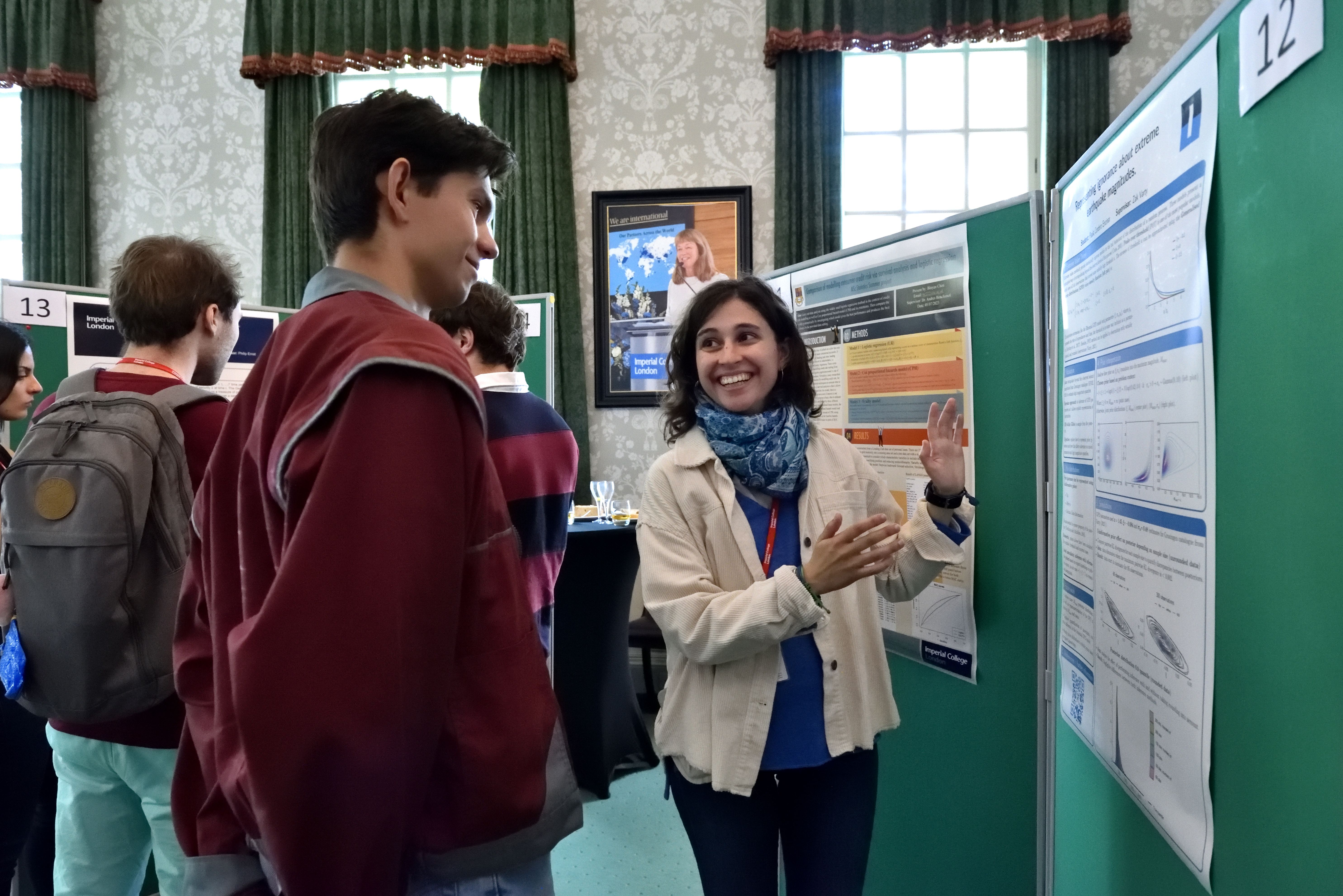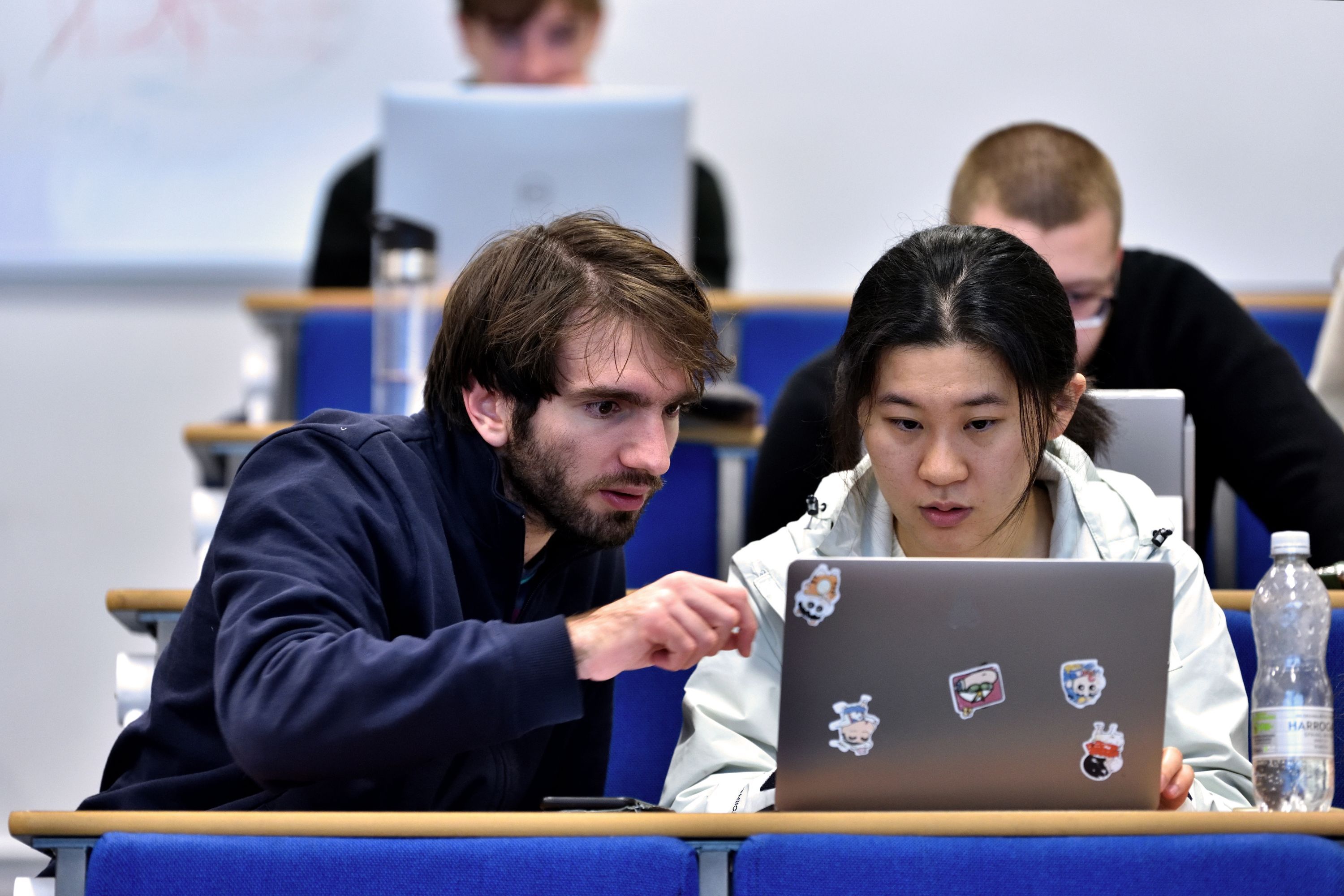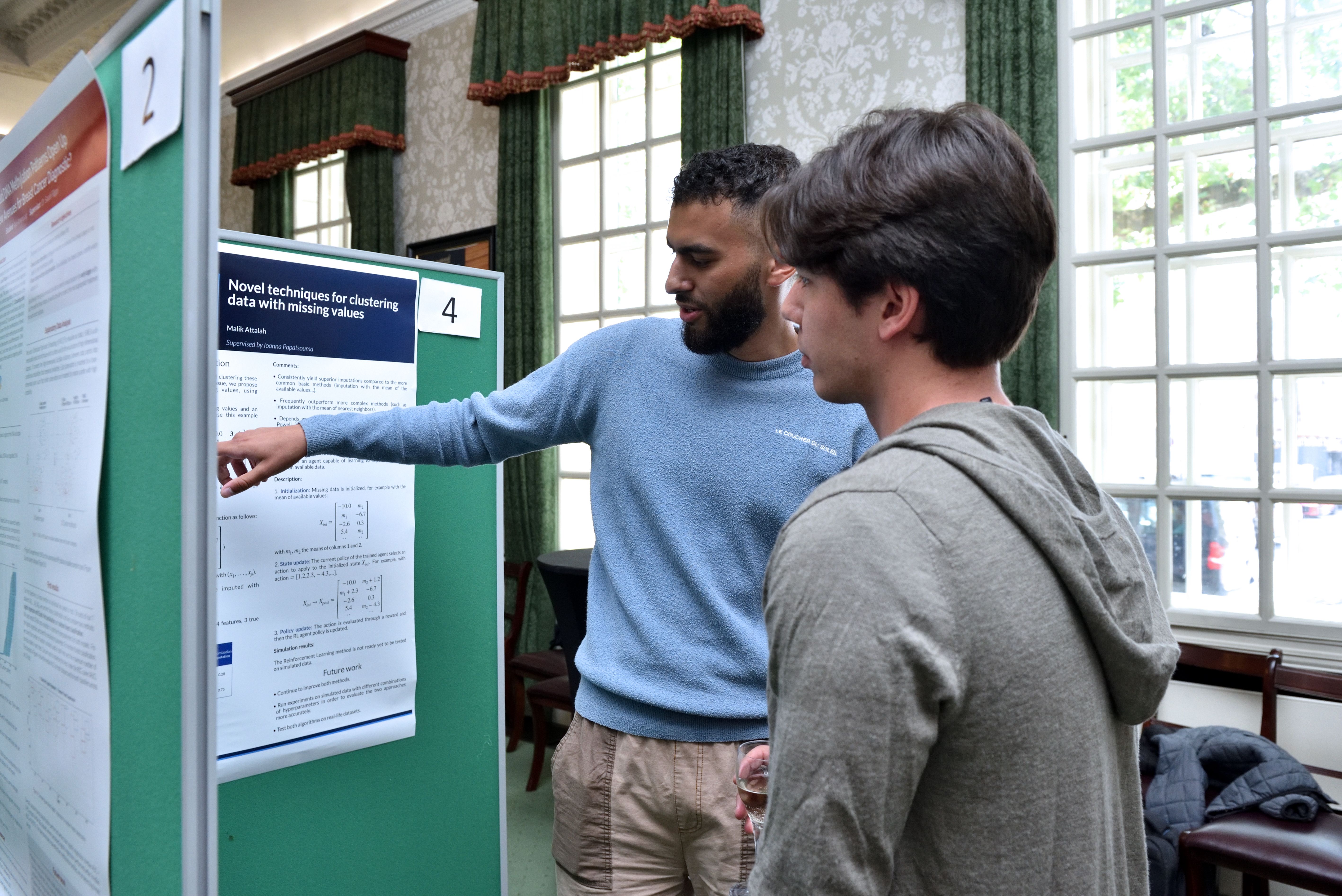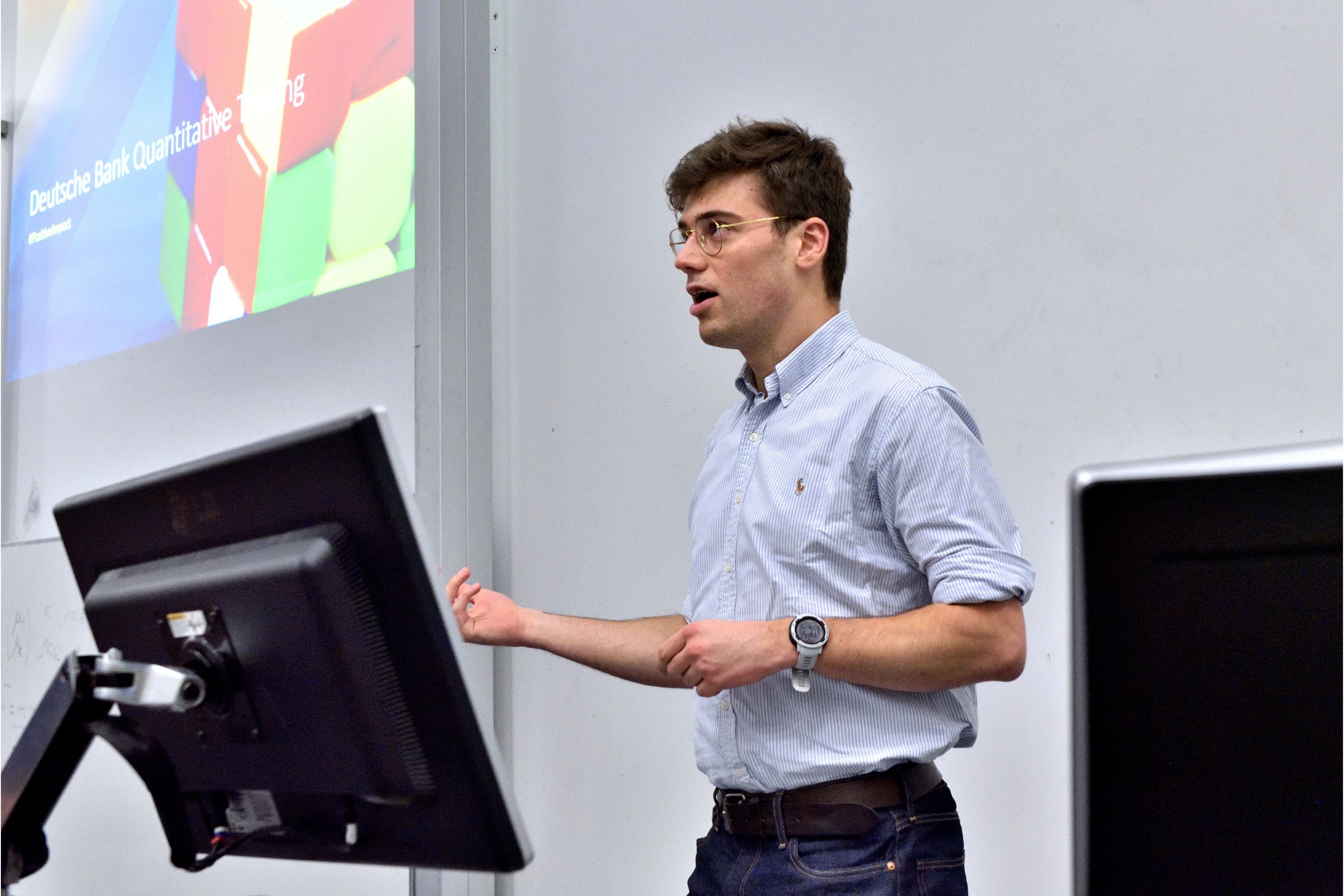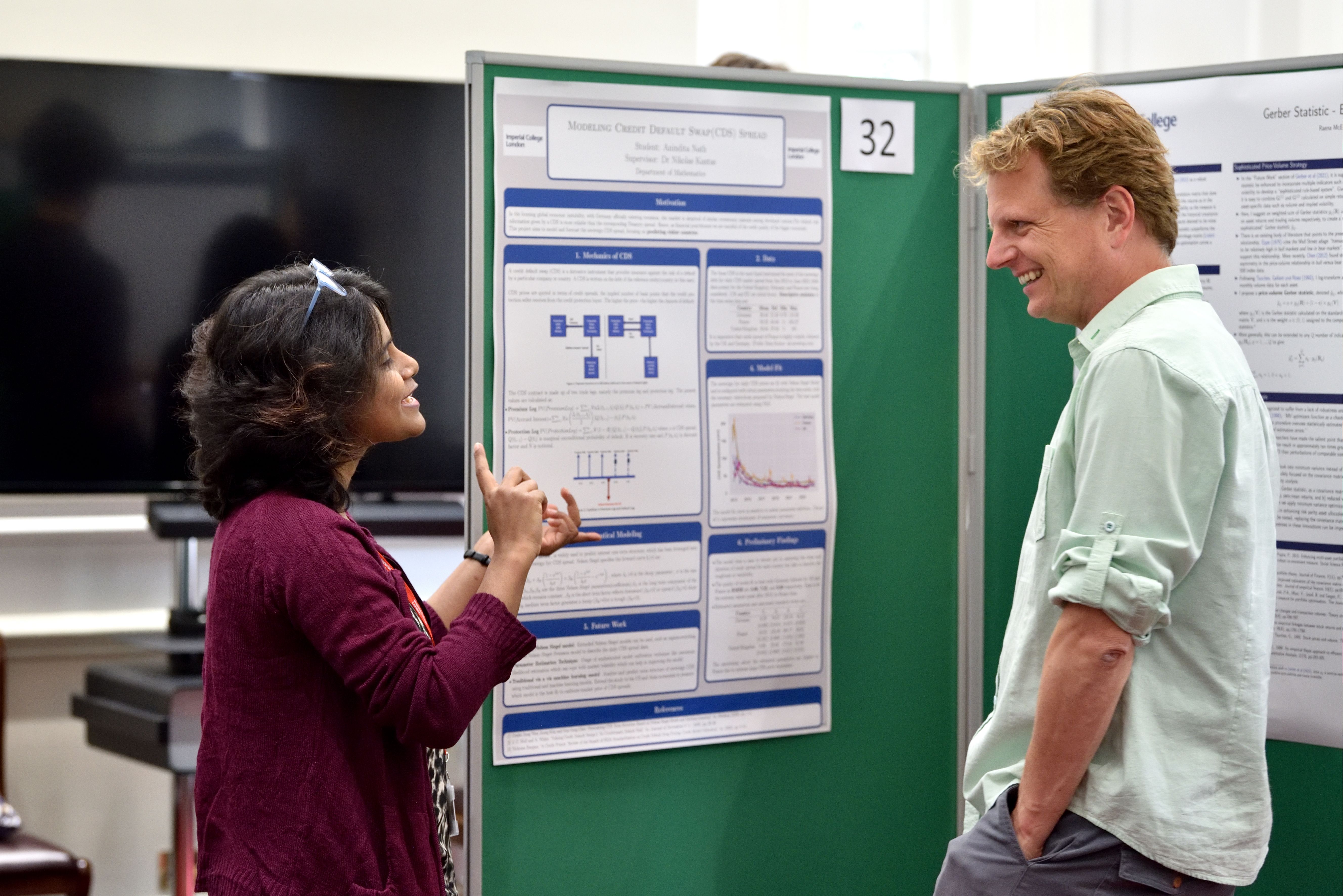.jpg)
Statistics (Data Science)
Build familiarity with a wide range of data science techniques and their application in a variety of settings.
Build familiarity with a wide range of data science techniques and their application in a variety of settings
Get industry recognition with an accredited degree
Apply your statistical knowledge to a state-of-the-art research problem related to data science
Course key facts
-
Qualification
-
MSc
-
-
Duration
1 year
-
Start date
September 2025
-
Study mode
Full-time
-
Fees
£21,300 Home
£35,700 Overseas
-
Delivered by
-
Location
-
South Kensington
-
Minimum entry standard
-
2:1 in statistics, mathematics, engineering, physics or computer science
Course overview
Applied StatisticsDevelop your appreciation of data science techniques and their application in statistics on this Master's course.
You'll explore a wide range of statistical methods used in data science and explore current developments in the field.
This course considers how these methods are used in a variety of areas. These include scientific, governmental, industrial and commercial settings.
You'll also carry out an independent investigation in an area of data science using research techniques acquired from the course.
Data Science is one of six Statistics streams available at Imperial. You may wish to consider choosing one of the following streams:
- Statistics (generic stream)
- Applied Statistics
- Biostatistics
- Data Science (this stream)
- Statistical Finance
- Theory and Methods
Testimonials
Structure
This page is updated regularly to reflect the latest version of the curriculum. However, this information is subject to change.
Find out more about potential course changes.
Please note: it may not always be possible to take specific combinations of modules due to timetabling conflicts. For confirmation, please check with the relevant department.
You'll take all of these core modules.
Core modules
Examine statistical modelling and regression and apply it to realistic problems and real data.
Engage with a number of computational methods that are key in modern statistics and learn to implement and apply these methods confidently.
Appreciate different Bayesian and frequentist approaches to statistical inference and select and justify appropriate methods for hypothesis testing.
Assess the key concepts of probability theory and learn how random variables and vectors and their distribution functions are defined.
You choose at least three modules from Group A and the remainder from Group B to total 30–32.5 ECTS.
Each module is worth 5 ECTS unless otherwise stated.
Optional modules - Group A
Examine central modern concepts in Bayesian statistical analysis.
Learn statistical concepts such as parameter estimation with large scale data and explore data sampling strategies in a Big Data world.
Design and develop data analysis procedures using Big Data technology (Hadoop and Spark), learn to utilise Big Data technology to perform a rigorous statistical analysis, and describe and apply mathematical techniques for fitting statistical models at scale and dealing with streaming data.
Become familiar with the most common data scientific methods and their uses and misuses.
Explore the building blocks of deep learning models, and how to design network architectures for specific applications.
Learn the mathematical foundations and put into practice how and why machine learning and deep learning algorithms often work so impressively well.
Optional modules - Group B
Gain a basic understanding of simulation, along with its uses and limitations, and the models for which basic or sophisticated simulation methods can be applied.
Further your understanding of statistical finance by engaging with modern statistical methods for analysis of financial data.
Explore fundamental concepts of quantitative finance and statistical methods that are widely used to analyse financial data.
Investigate theoretical and methodological statistical foundations for spatial data.
Appreciate the importance of handling high dimensional datasets, through the analysis of genetics (genomics) and bioinformatics data.
Study stochastic processes and the basic tools from stochastic analysis that provide the mathematical foundations for option pricing theory.
Discover why survival models are fundamental to actuarial work and explore key actuarial applications
Examine discrete time stochastic processes and associated computational algorithms and approaches.
You'll also complete an extensive research project full-time between May and September, exploring an area of data science.
This will include an opportunity to work with a member of academic staff on a state-of-the-art research problem that suits your interests.
Teaching and assessment
Balance of teaching and learning
Key
- Lectures, tutorials and practicals
- Research project
- 67% Lectures, tutorials and practicals
- 33% Research project
Teaching and learning methods
-
Dissertation
-
Group tutorials
-
Lectures
-
Modern statistical computing skills
-
Office hours
-
Oral presentation and assessment
-
Practical computational sessions
-
Problem classes
-
Research seminars
-
Virtual learning environment
Balance of assessment
Key
- Modules
- Research project
- 67% Modules
- 33% Research project
Assessment methods
-
Assessed coursework/tests
-
Enhanced coursework assessments
-
Oral presentation
-
Written examinations
-
Written project
Entry requirements
We consider all applicants on an individual basis, welcoming students from all over the world.
How to apply
Apply online
You can submit one application form per year of entry. You can choose up to two courses.
Application deadlines – Round 1 closes on Thursday 16 January 2025
We operate a staged admissions process with several application rounds throughout the year.
Apply by 23.59 (UK time) on the closing date of an application round, to ensure you receive a response on your application by the relevant decision date.
Application rounds
Round 1
- Apply by Thursday 16 January 2025
- Decision by Thursday 6 March 2025
Round 2
- Apply by Thursday 27 March 2025
- Decision by Thursday 1 May 2025
Round 3
- Apply by Thursday 15 May 2025
- Decision by Thursday 17 July 2025
There is no application fee for MRes courses, Postgraduate Certificates, Postgraduate Diplomas, or courses such as PhDs and EngDs.
If you are applying for a taught Master’s course, you will need to pay an application fee before submitting your application.
The fee applies per application and not per course.
- £80 for all taught Master's applications, excluding those to the Imperial College Business School.
- £100 for all MSc applications to the Imperial College Business School.
- £150 for all MBA applications to the Imperial College Business School.
If you are facing financial hardship and are unable to pay the application fee, we encourage you to apply for our application fee waiver.
Find out more about how to apply for a Master's course, including references and personal statements.
We do not interview for applicants for entry to this programme.
When you apply, you will be able to choose your stream of choice.
If you are applying for the general stream of this course, we are only able to consider your application if you choose this as your first course choice.
If you are applying for one of the specialisation streams, please select the stream as your first course choice and we will automatically consider you for the general stream if your chosen specialisation is full.
An ATAS certificate is not required for students applying for this course.
Tuition fees
Home fee
2025 entry
£21,300
You should expect and budget for your fees to increase each year.
Your fee is based on the year you enter the university, not your year of study. This means that if you repeat a year or resume your studies after an interruption, your fees will only increase by the amount linked to inflation.
Find out more about our tuition fees payment terms, including how inflationary increases are applied to your tuition fees in subsequent years of study.
Whether you pay the Home or Overseas fee depends on your fee status. This is assessed based on UK Government legislation and includes things like where you live and your nationality or residency status. Find out how we assess your fee status.
If you're a UK national, or EU national with settled or pre-settled status under the EU Settlement Scheme, you may be able to apply for a Postgraduate Master’s Loan from the UK government, if you meet certain criteria.
For courses starting on or after 1 August 2024, the maximum amount is £12,471. The loan is not means-tested and you can choose whether to put it towards your tuition fees or living costs.
The loan is not means-tested and you can choose whether to put it towards your tuition fees or living costs.
The Martingale Foundation are offering fully funded scholarships for eligible students on selected Mathematics courses.
Overseas fee
2025 entry
£35,700
You should expect and budget for your fees to increase each year.
Your fee is based on the year you enter the university, not your year of study. This means that if you repeat a year or resume your studies after an interruption, your fees will only increase by the amount linked to inflation.
Find out more about our tuition fees payment terms, including how inflationary increases are applied to your tuition fees in subsequent years of study.
Whether you pay the Home or Overseas fee depends on your fee status. This is assessed based on UK Government legislation and includes things like where you live and your nationality or residency status. Find out how we assess your fee status.
If you're a UK national, or EU national with settled or pre-settled status under the EU Settlement Scheme, you may be able to apply for a Postgraduate Master’s Loan from the UK government, if you meet certain criteria.
For courses starting on or after 1 August 2024, the maximum amount is £12,471. The loan is not means-tested and you can choose whether to put it towards your tuition fees or living costs.
The loan is not means-tested and you can choose whether to put it towards your tuition fees or living costs.
The Martingale Foundation are offering fully funded scholarships for eligible students on selected Mathematics courses.
Scholarships
Statistics scholarships
Value per award
- Varies
Who it's for
- All applicants to the MSc in Statistics.
How will studying at Imperial help my career?
Develop highly transferable skills that will prepare you for further study of statistics or a career within data science.
These include skills in programming, problem-solving, critical thinking, scientific writing, project work and presentation.
Mathematics graduates at Imperial are highly sought after in a wide array of employment and research sectors.
These include banking and finance, accountancy, education, and IT and technology.
Further links
Contact the department
- Email: statsmsc@imperial.ac.uk
Course Director: Dr Oliver Ratmann
Visit the Department of Mathematics website.

Request info
Find out more about studying at Imperial. Receive updates about life in our community, including event invites and download our latest Study guide.

Events, tasters and talks
Meet us and find out more about studying at Imperial.

Terms and conditions
There are some important pieces of information you should be aware of when applying to Imperial. These include key information about your tuition fees, funding, visas, accommodation and more.
You can find further information about your course, including degree classifications, regulations, progression and awards in the programme specification for your course.
Programme specifications
